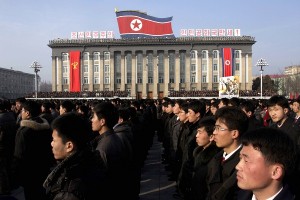US urges talks as world watches for N. Korea missile
TOKYO – Secretary of State John Kerry said Monday the US will talk with North Korea if it takes “meaningful steps” towards peace, as the world watched to see if Pyongyang will mark its founder’s birthday with a missile launch.
The isolated state has a habit of linking high-profile military tests with key dates in its annual calendar and expectations are high that it could fire two medium-range missiles in honour of late former leader Kim Il-Sung.
But Kerry, speaking in Japan on the last leg of an Asian tour dominated by the crisis on the Korean peninsula, appealed to the North to step back.
“The United States remains open to authentic and credible negotiations on denuclearization, but the burden is on Pyongyang,” he said.
“North Korea must take meaningful steps to show it will honour commitments it has already made.”
Article continues after this advertisementKerry, who met with Japan’s Prime Minister Shinzo Abe on Monday as his three-country tour came to an end, said talks in China and in South Korea had already demonstrated the world was speaking with one voice.
Article continues after this advertisement“One thing is certain: we are united. There can be no confusion on this point,” he said.
“The North’s dangerous nuclear missile program threatens not only North Korea’s neighbors, but also its own people.”
The Korean peninsula has been in a state of heightened military tension since the North carried out its third nuclear test in February.
Incensed by fresh UN sanctions and joint South Korea-US military exercises, Pyongyang has spent weeks issuing blistering threats of missile strikes and nuclear war.
Washington insists that the “six-party” talks on denuclearization – which take in both Koreas, Japan, Russia, China and the US – is the only forum at which it will sit with Pyongyang.
While in Asia, Kerry has talked tough on the North’s “unacceptable” rhetoric, but also sought to lower the temperature by supporting dialogue with Pyongyang and saying he would be “prepared to reach out” to North Korea.
In Seoul, he gave Washington’s public blessing to peace overtures made by South Korea’s new president, Park Geun-Hye, who in recent days has signalled the need to open a dialogue and “listen to what North Korea thinks”.
But the North rejected the overtures as “empty talk” and a “crafty trick” to conceal Seoul’s aggressive intentions.
“It is very regrettable that the North dismissed our offer,” the South’s Unification Ministry said Monday, labelling Pyongyang’s response “totally incomprehensible.”
North Korea’s current leader and Kim Il-Sung’s grandson, Kim Jong-Un, opened Monday’s birthday events with a visit to the mausoleum in Pyongyang housing the embalmed bodies of his grandfather and his father Kim Jong-Il.
State television interspersed musical programming with documentaries on the life of Kim Il-Sung and footage of Korean soldiers honing their martial arts skills.
Kim Il-Sung’s birthday is normally marked with a large military parade that North Korea uses to showcase its weaponry to the world.
The missiles mobilized by the North for a possible launch are reported to be untested Musudan models with an estimated range of up to 2,485 miles (4,000 kilometers).
That would cover any target in South Korea and Japan, and possibly even US military bases on the Pacific island of Guam.
South Korean and US forces have been on a heightened state of alert for days, and Japan has deployed Patriot anti-missile systems around Tokyo and promised to shoot down any missile deemed to be a threat.
South Korean Defense Ministry spokesman Kim Min-Seok said the alert would remain in force even in the absence of a missile launch on Monday.
“We believe the situation may drag on for quite a while,” Kim said.
In Seoul on Friday, Kerry said a launch in the current climate would be a “huge mistake” and the next day in Beijing he pressed Chinese leaders to take a firmer stand with North Korea.
China is Pyongyang’s sole major ally and backer, and is widely seen as the only country with leverage to influence its actions – although it is reluctant to risk destabilising the regime.
Kerry won a promise that China would work together with the United States to reduce tensions and persuade the North to give up its nuclear weapons programme.
